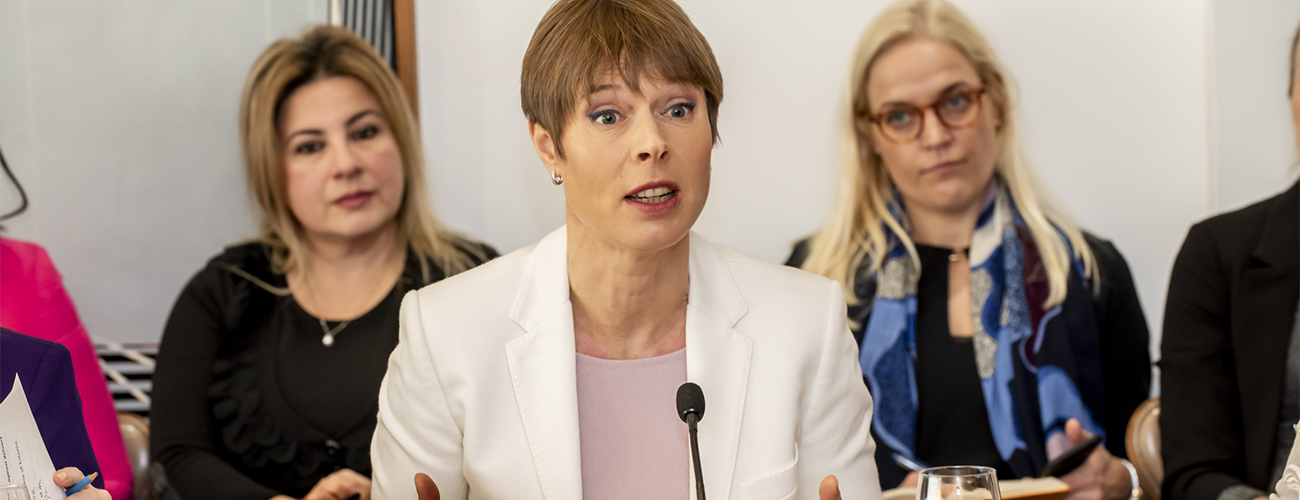“Progress has been made thanks to these women who have never shut up, who will never shut up,” said the President of Estonia, Kersti Kaljulaid, speaking to a roundtable of 18 female diplomats at IPI. More than one year into the Secretary-General’s gender parity strategy, the ratio of female to male diplomats at the United Nations has increased. But while the number of women in multilateral leadership positions is improving, serious barriers to their full participation in this arena remain.
Progress towards gender equality and these remaining barriers were the focus of a March 11th IPI event, co-hosted with the Permanent Mission of Estonia to the UN, and entitled “Women in Diplomacy: Creating Transformative Change.”
To introduce the discussion, President Kaljulaid recalled that 15 years ago, 20 percent of Estonian heads of mission were women. This number has now increased to 40 percent. In spite of the obstacles to equality, she insisted, “we can never let go” in the battle for gender equality. She also noted that freedom of the press had allowed women to actively and publicly demand equality, in turn propelling more Estonian women into politics and high-level posts.
María Fernanda Espinosa Garcés, the President of the UN General Assembly, recalled the enormous changes she had witnessed in her career. When she was appointed minister of foreign affairs of Ecuador, she said that out of 85 ambassadors, there were only three women. These women often were not permitted on missions, because they had families, she explained. The government, in response, passed ministerial codes that allowed for the promotion of women diplomats into higher positions within the Ministry of Foreign Affairs, taking action to eliminate references to the physical appearance or marital status of applicants, and basing selection process exclusively on professional and academic profile.
“It is important that everything is put into writing so it stays part of cultural and institutional architecture,” she said, reflecting on a time when women with sufficient experience and training were not given opportunity because they were expected to take care of children. In 2018, the Foreign Ministry presented a written “Policy for Gender Equality” to promote gender equity in diplomacy.
Ms. Espinosa Garcés addressed a number of ways in which women are currently represented in the multilateral community. She highlighted the disparity among key figures, including that out of 21 vice presidents of the General Assembly, only one is female, and one out of six chairs of committees is a woman. She shared some of the ways she strives for gender equality in her own work, including by objecting when offered a place on panels solely made up of men, and by making sure that 60% of the UN facilitators she appoints are female.
“It’s not only about optics and form and numbers, it is about making a difference in the way we exercise leadership,” she said. “We have a lot to do to break stereotypes to share the message” that women’s participation makes a positive difference in decision-making.
Deputy Secretary-General Amina J. Mohammed urged the women at the table to continue sharing their personal experiences. Drawing insights from their own careers, she said, could help support younger generations in achieving more effective solutions. “Things are changing,” she continued, “the intergenerational transition is difficult.” Exchanging strategies for catalyzing change within networks of women leaders could, she indicated, “give the next generation the tools to deal with it.”
As international civil servants, women in diplomacy have a “huge job to do from the inside out” to achieve gender parity in the workplace, said Ambassador Mohammed. And to do it, “We need to have women in decision-making roles in the Secretariat.” It is also “incredibly important that men are seen as partners and collaborators” in this process, she said. She concluded, “I think women in positions of leadership will help us get much further than we’ve ever been.”
IPI Senior Fellow Sarah Taylor moderated.








